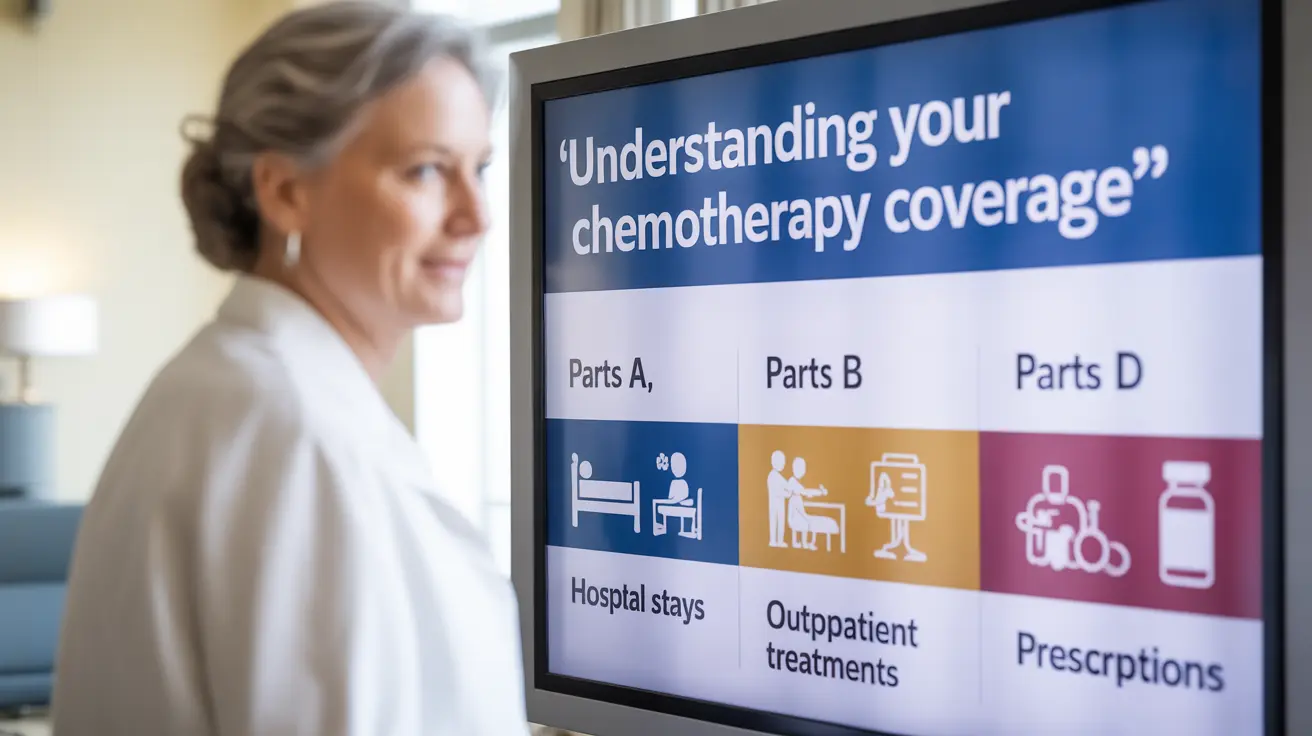When facing a cancer diagnosis, understanding how Medicare covers chemotherapy treatment is crucial for planning your care and managing costs. Medicare provides substantial coverage for chemotherapy through its various parts, but the specifics depend on where you receive treatment and what type of Medicare plan you have.
This comprehensive guide will explain how different Medicare parts cover chemotherapy treatments, medications, and related services, helping you understand your coverage and potential out-of-pocket costs.
Medicare Coverage for Hospital-Based Chemotherapy
If you receive chemotherapy as an inpatient in a hospital, Medicare Part A provides coverage for your treatment. This includes:
- Room and board during your hospital stay
- Nursing care and other hospital services
- Chemotherapy drugs administered during your stay
- Related medications and treatments
For inpatient services, you'll need to pay your Part A deductible and any applicable coinsurance. After meeting your deductible, Medicare covers most of the remaining costs for your hospital stay.
Outpatient Chemotherapy Coverage Under Medicare Part B
Many patients receive chemotherapy in outpatient settings, such as doctor's offices or outpatient clinics. Medicare Part B covers these treatments, including:
- Chemotherapy drugs administered via IV or injection
- Doctor visits and supervision
- Nursing services
- Treatment-related laboratory tests
- Certain oral anti-cancer drugs
Under Part B, you typically pay 20% of the Medicare-approved amount for these services after meeting your annual deductible.
Medicare Part D Coverage for Chemotherapy Drugs
Medicare Part D provides coverage for prescription drugs you take at home, including:
- Oral chemotherapy medications
- Anti-nausea drugs
- Other medications to manage side effects
- Self-administered cancer drugs
Coverage and costs vary by plan, so it's important to check your specific Part D plan's formulary and cost-sharing requirements.
Medicare Advantage (Part C) and Chemotherapy
Medicare Advantage plans must provide at least the same coverage as Original Medicare (Parts A and B) for chemotherapy. However, these plans may:
- Offer different cost-sharing structures
- Require prior authorization for certain treatments
- Have specific network requirements
- Include additional benefits not covered by Original Medicare
Review your plan's specific terms and network requirements to understand your coverage and costs.
Managing Chemotherapy-Related Costs
To help manage your out-of-pocket expenses:
- Consider purchasing Medicare Supplement (Medigap) insurance
- Review your plan's annual out-of-pocket maximum
- Discuss treatment costs with your healthcare provider
- Investigate financial assistance programs
- Keep track of all medical expenses for tax purposes
Frequently Asked Questions
Does Medicare cover chemotherapy treatments received in a hospital versus an outpatient clinic? Yes, Medicare covers chemotherapy in both settings. Part A covers inpatient hospital treatments, while Part B covers outpatient treatments. Coverage details and cost-sharing differ between these settings.
What chemotherapy drugs does Medicare Part B and Part D typically cover? Medicare Part B covers drugs administered by healthcare professionals, including IV chemotherapy and some oral anti-cancer drugs. Part D covers most oral chemotherapy drugs and medications taken at home.
How much will I have to pay out of pocket for chemotherapy under Original Medicare? Under Original Medicare, you'll pay your Part A deductible for inpatient care and 20% of Medicare-approved amounts under Part B after meeting your deductible. Part D costs vary by plan and medication.
Can Medicare Part C (Medicare Advantage) cover chemotherapy drugs and treatments differently than Parts A and B? Yes, while Medicare Advantage plans must provide at least the same coverage as Original Medicare, they may have different cost-sharing structures, network requirements, and prior authorization rules.
Does Medicare cover medications to manage side effects caused by chemotherapy, like anti-nausea drugs? Yes, Medicare covers many medications to manage chemotherapy side effects. Part B covers some drugs administered in medical settings, while Part D covers prescribed medications you take at home.




